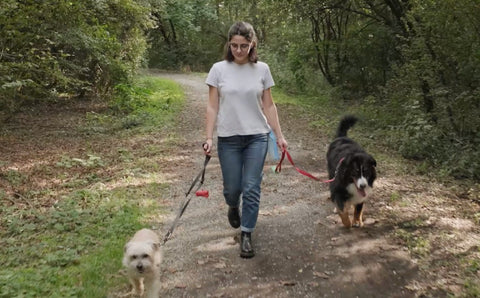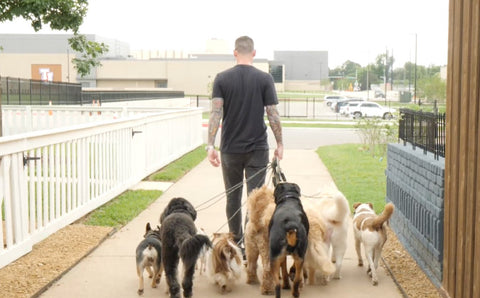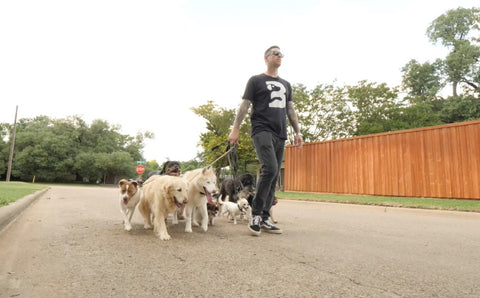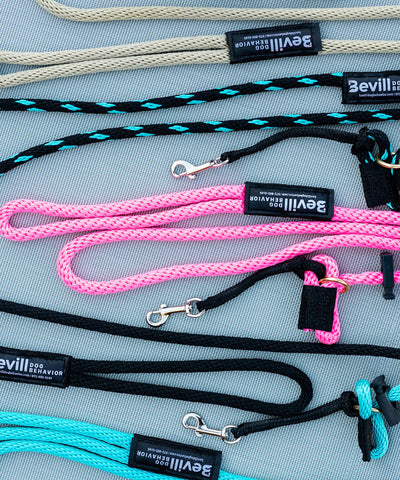Dog behaviorist Brad Bevill has a unique sense of how a dog owner thinks. Make no bones about it."Rather than trying to force them [dogs] to learn how you [humans] function, you learn how they function and interact with them respectfully, based on how they function," Bevill said. "It's like going to another country, respecting the customs and the culture and learning the language, versus saying, 'I am an American. Learn English! I don't care where you are from. I don't care what your culture is. I don't care what your customs are. You change for me because I'm American!' "And that's what people do," Bevill continued. "They bring dogs into their house and ask the dog to change for them. 'You do what I want! I don't like that! It's inconvenient for me!' Well, it may be inconvenient for you, but that's the way a dog works, and you don't [expletive] understand it so you are annoyed, and you are annoyed because you don't understand it. "Dog psychology is understanding the species in front of you. Their customs. Their culture. How their brain works. Their language. And changing for them."
Bevill, 45, launched Bevill Dog Behavior, that began as hands-on human and dog behavior and wellbeing services that has evolved into a series of online courses. His facility near Preston Hollow will remain open, but his new entity will be called "Sit. Stay. Breathe." found at his website www.sitstaybreathe.com.

"When I grew up [in Irving] we had dogs, a rooster, a rabbit and ducks in the backyard," Bevill said. "They lived together harmoniously. They all ate out of the same dog bowl, and all ate dog food. And I didn't think it was a big deal. Inside the house, we had parakeets, hamsters, gerbils, mice, Guinea pigs, and sugar glider squirrels. I even raised a baby squirrel that fell out of a tree during a storm. I mean, I had animals around me constantly.
We were lower middle class. My mom grew up in Oak Cliff and my dad grew up in Pleasant Grove. It was just life.
"You tell someone that you went to work all day and left a rabbit, rooster and dogs in the backyard, and they would say, 'What is wrong with you?' Back then, it was just normal."
Bevill had an 18-year corporate career in marketing and advertising before he went to the dogs. He toiled on both the agency and client side of marketing and worked for Finnish-based telecommunications giant Nokia. He then moved over to opening a digital ad agency in San Francisco before landing in casual dining with Canadian pizza giant Boston Pizza. "I got sick of the agency life, went through a divorce and said, 'I've got to get my life back,'" Bevill said. "When I left the agency [for Boston Pizza], I left mostly for a lifestyle change. I was burned out and tired of travelling. The restaurant business is an old school industry and gave me the quality of life I was looking for. I needed the job and the income, but I looked at it as a transition. I knew I was always going to own my own business. I just didn't know what that business was."
He applied business exercises to determine his future professional focus. Bevill said, "It was like, 'What do you love? What are you good at? What do people need? And what will they pay for?' And the intersection of those four quadrants kept coming back to something that helps people. Teaching and animals also kept coming up. I wanted to make a difference. I was selling pizza and burgers to people. Then I got a dog and thought there is something to this. I was really good with dogs even though I hadn't studied it. And I found there was a huge market for it."

Bevill began building his brand, reaching back to his marketing experience to promote it and opened Bevill Dog Behavior. "The weekend I launched it, I got a three-month long waiting list and it has never been less than that." Area dog owners embraced Bevill's different perspective of a dog's life. "Fifty years ago, my job didn't exist. There was no such thing as a dog behaviorist, because people didn't f*** up dogs like they do now." Bevill cites the book The Comfort Crisis by Michael Easter. "Life has become so comfortable, that it is causing us a lot of stress and issues which sounds counter intuitive. But we are not challenged. We don't grow. We expect everything to be handed to us. We overly coddle our kids. We don't challenge them. We overly coddle our dogs. We don’t challenge them. "I tell clients all the time that I would never have a business in Montana, because people in Montana don’t treat their dogs the way people in Dallas do. They actually fulfill them. They understand animals." The generations of Montanans that grew up in ranching and agriculture are far removed from the current crop of natives and transplants that make up Dallas.
"[In Montana] If they don't have a ranch, their parents do, or their grandparents do. We [in Dallas] don’t even understand animals anymore," Bevill said. "We are treating them like infants. They are dogs. When you start to honor them as the species that they are, they start to behave the way you want them to."
The first step of Bevill’s comprehensive wellness program focuses on the mental health of humans and animals. Bevill has teamed with author and meditation teacher Miguel Chen (Dallas Meditation Center, Blossom Yoga) to create a course where the dog’s wellbeing is equally important to the humans. Bevill believes that people look externally to dogs for happiness and don’t get a dog to make their life worse. But it can become a misguided search for external happiness that can cause your dog’s unhappiness. “While we all inherently know how important our own mental, physical, and spiritual health is, I think we forget that our dog's mental, physical, and spiritual health is just as important. What’s amazing is how the two are connected. "It's all about trust and respect," Bevill said. "It's the 'I trust and respect you, so I honor you and fulfill you.' And you will honor and respect me. You live in my house the way I want you to because there is mutual trust and mutual respect."
As Bevill shifts focus from "being in the dog behavior business to the human education business," the end result remains finding a fulfilling coexistence. He has started working with corporations and professional athletes, through the eyes of dog psychology, in team building and leadership training. "The way you lead a dog is also the way you lead people. And everyone loves dogs."
Sit. Stay. Breathe. is available at www.sitstaybreathe.com starting May 01, 2022.
About Brad Bevill
Loving dogs is one thing but communicating with and leading dogs in an instinctual way is another. Brad learned that lesson at an early age while working on his uncle’s ranch in northern Oklahoma. Watching cattle dogs work was a new experience and opened his eyes to the organic bond that exists between humans and dogs. The willingness dogs have to communicate with us, their desire to fulfill our requests, and their ability to read and understand our emotions, energy, body language, and commands were so apparent on a ranch (where dogs still had real jobs). That experience on the ranch changed Brad’s life forever. In 1992, Brad started training family dogs for the first time and fell in love with a new language – the common, unspoken language between humans and dogs.
Following 18 years of high-level marketing and advertising positions in Corporate America, Brad felt the pull to do work that was in line with his deepest values and that truly made a difference in people’s lives.
Bevill Dog Behavior was founded in 2013 to combine Brad's passion for animal and human psychology with his knowledge of behavioral studies. Brad’s unique system and success rehabilitating some of the most difficult dogs alive have gained him multiple notable clients, a book deal, and appearances on numerous TV shows.
Having studied under Cesar Millan, Brad still works with Milan's Dog Psychology Center in Santa Clarita. Brad is a Trainer and also the Volunteer Director (managing a team of 15-20 volunteers) for Cesar's “Training Cesar’s Way” workshops. Brad is honored and humbled to continue to learn from the best dog behaviorist in the world while also supporting his mission of “Better Humans. Better Planet."
About Miguel Chen
Miguel Chen is a musician, author, and teacher of yoga and meditation. He is the center director of the Dallas Meditation Center. As a musician, he is the bassist (and a songwriter) for relentless punk-rock stalwarts Teenage Bottlerocket, whose latest album, Sick Sesh!, is out now. As an author, Miguel has published I Wanna Be Well: How a Punk Found Peace and You Can Too and The Death Of You: A Book for Anyone Who Might Not Live Forever, both of which combine his passion for music, yoga, and spirituality. His books have gained praise and reviews from Publishers Weekly and NYT bestselling author Sharon Salzberg among others. He has also written a children’s book, The Virus, illustrated by David Buist. When not touring with Teenage Bottlerocket, Miguel leads teachings as an ERYT-500 both online and in-person at the self-owned Blossom Yoga.
He and his various modes of expression have been featured on CNN, The Washington Post, Lion’s Roar, Spin, Rolling Stone, Alternative Press, New Noise magazine, and plenty more.








